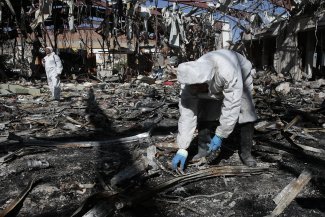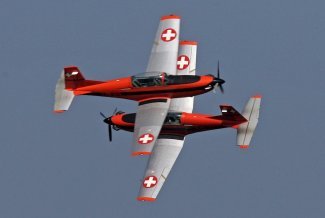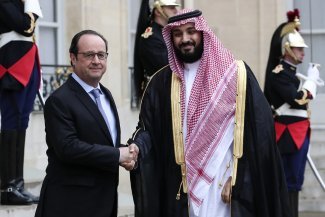A group of Yemenis receive aid and basic supplies at a camp for displaced people in the Khokha district of Yemen’s war-torn western province of Hodeida. Image taken on 31 January 2022.
Yemen is entering its seventh year of civil war, with no end in sight. The United Nations describes it as the “worst humanitarian crisis in the world,” with some 24 million people – more than 65 per cent of the country’s population – in need of urgent humanitarian assistance. Numerous reports have stated that all parties to the conflict, including the United Arab Emirates (UAE) and Saudi Arabia (allies of Yemen’s exiled president Abdrabbuh Mansur Hadi), have committed war crimes. But this hasn’t stopped several European countries from signing multi-million dollar contracts with the two Persian Gulf petro-monarchies, leading to repeated denunciations by human rights organisations
The export of French CAESAR howitzers to the UAE, for example, or of Typhoon and Tornado bombers and their components to Saudi Arabia, could constitute a violation of international and EU law. “International law in this area uses some vague terms such as ‘risk’ and ‘serious,’ which are open to different interpretations. But in the specific case of the war in Yemen, arms exports [to Saudi Arabia and the UAE] clearly violate the law,” argues Eduardo Melero of the Delàs Peace Studies Centre. In 2019, a group of NGOs, including the Delàs Centre, sent a report on the matter to the Office of the Prosecutor of the International Criminal Court urging it to open an investigation into possible war crimes.
Long fraught, the Middle East region has experienced a particularly turbulent decade. In addition to the war in Yemen and the coup d’état in Egypt, the wars in Syria and Libya rage on. According to the Stockholm International Peace Research Institute (SIPRI) within that same period – between 2013 and 2017 – arms imports by states in the region increased by 103 per cent over the previous five-year period, accounting for 32 per cent of global arms imports (a percentage which has since remained steady).
Saudi Arabia currently leads the global ranking of arms imports, followed by Egypt in third place and the UAE in ninth place. Despite these countries’ involvement in serious human rights violations, they count France, the UK and Germany, along with the United States, among their main suppliers.
“The United States is the main arms exporter to the Middle East, but Europe plays an important role. However, the reality in the region is complex and diverse, since no European countries sell any weapons to Iran,” says Pieter Wezeman, a senior researcher at SIPRI. The increase in sales to the Middle East partly explains the boom in Europe’s arms industry, which has grown from a turnover of €33 billion in 2008 to almost €170 billion in 2018.
From flexible export criteria to intra-EU controls
The arms trade is regulated by an international treaty that entered into force in 2014 and prohibits sales when they contribute to war crimes or international human rights violations. The EU approved its own Common Position in 2008, which stipulates that all member states must meet eight criteria for authorising an arms export. “The Common Position contains more precise language than the international legislation. However, the states themselves are the only ones in charge of interpreting the norm, and they usually do so in a lax manner that allows for exports,” says Melero, who laments the “opacity” surrounding the sector. “Economic and geopolitical interests take precedence. These exports often sustain national defence industries,” he adds. According to the European Aerospace and Defence Industries Association, the sector employs some 440,000 people, although some, Wezeman included, believe this figure could be inflated.
Leaving aside the legality of exports to certain countries, it is important to consider whether such exports pose a threat to peace and security in the region. “Most observers agree that the sale of weapons to Saudi Arabia and the UAE has reinforced their conviction that they could attain a military victory in Yemen, and it has extended the war,” says Wezeman. Pressure from European civil society has led some states to restrict arms transactions with certain countries, notably Saudi Arabia. “Some European States have restricted or completely stopped their deals with Saudi Arabia, such as Germany, Netherlands and Sweden. But others, like France, have not,” he adds.
Moreover, the boom in Europe’s arms sector, which has recently seen contracts for astronomical sums, could be shaping some countries’ foreign policy more so than in previous decades.
The case of France is telling. Between 2015 and 2019, French weapons’ exports jumped by 72 per cent, largely thanks to deals like the 2015 sale of 24 Rafale fighter bombers to Egypt for around €5 billion. “With that agreement, Egypt saved the entire line of production of Rafale jets. And that helps to explain the alignment between Paris and Cairo over the last years,” says Timothy Kaldas, an analyst specialising in Egypt. According to Human Rights Watch, in addition to the hundreds killed in the crackdown unleashed after the 2013 coup led by President Abdel Fattah al-Sisi, the Egyptian regime may have arrested more than 60,000 people on political grounds.
Indeed, it was Paris that ended al-Sisi’s period of international ostracism following the bloody coup. Shortly before the Rafale sale, François Hollande became the first Western leader to roll out the red carpet for the Egyptian dictator. Just a few months later, al-Sisi met with Angela Merkel of Germany, another major supplier. “Al Sisi has used his commercial deals, mostly arms deals and infrastructure projects, to win political backing abroad. When choosing his partners, he has been very strategic,” says Kaldas. France’s other major regional ally is the UAE, as the conflict in Libya has brought to light. The relationship between the two countries was consolidated last December with President Emmanuel Macron’s visit to Dubai and the purchase of 80 Rafale fighter-bombers for €16 billion.
After France and Germany, the other two EU countries with a powerful and growing arms industry are Spain and Italy, seventh and tenth respectively in SIPRI’s ranking of global arms exporters. The foreign policies of both countries reveal a certain deference to their main customers. Rome, for example, reconciled with Egypt after the brutal torture and murder by Egyptian police of Italian researcher Giulio Regeni, while at the same time signing off on the sale of two frigates to the country. Madrid for its part has led the EU in opposing any sanctions against Turkey, one of its main defence partners, for its actions in the eastern Mediterranean. It has also refused to join many Western countries in demanding the release of dissident Osman Kavala.
Such behaviour tarnishes the image of the EU, which often insists on the moral dimensions of its foreign policy. In an effort to end the inconsistency between Europe’s words and deeds, the Green group in the European Parliament have proposed an EU-level monitoring system: “Our proposal is to create a European-level body to analyse the situations in importing countries […]. The proposal also includes the possibility to assess any violations of the Common Position in the European Court of Justice, and give sanctions, such as an exclusion from the European Defence Fund. And that is a lot of money,” says Finnish MEP Alviina Alametsä, who is optimistic: “I think it is possible to introduce this change. The new German government supports a European-level control of arms exports, as do some companies, to create level playing field in the sector.”













